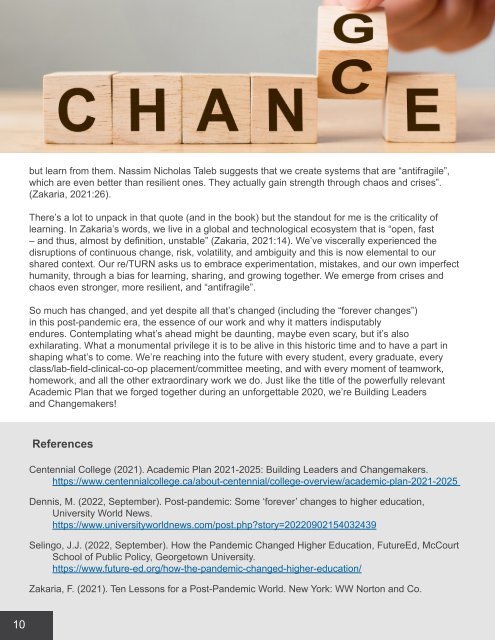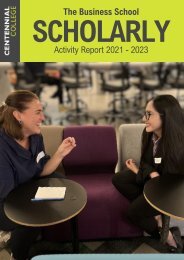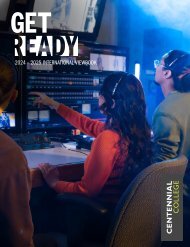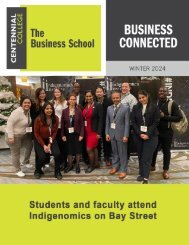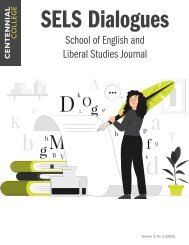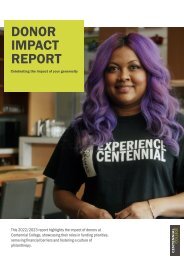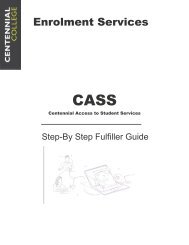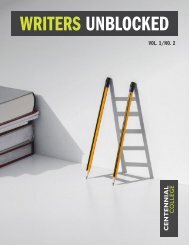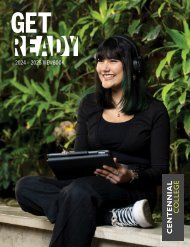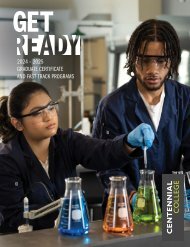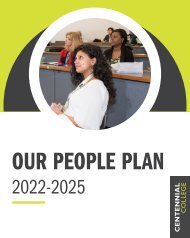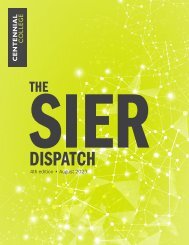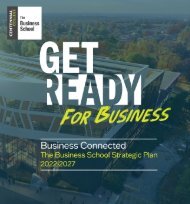The Teaching and Learning Innovation Digest - May 2023
Welcome to a truly special edition of the Teaching and Learning Innovation Digest! Our seventh annual academic publication has assumed an incredibly meaningful shape and form for a number of reasons. Not only did we receive an enthusiastic response with over 30 submissions via our institutional broadcast, but we also have consciously and intentionally embraced the principles of Universal Design for Learning by attempting to represent and celebrate the varied forms of expressions therein. From reflective essays, poetry, visual and performing arts, podcasts, video conversations to scholarly work, academic and applied research, news and updates, and interviews, this is truly a power-packed publication!
Welcome to a truly special edition of the Teaching and Learning Innovation Digest! Our seventh annual academic publication has assumed an incredibly meaningful shape and form for a number of reasons. Not only did we receive an enthusiastic response with over 30 submissions via our institutional broadcast, but we also have consciously and intentionally embraced the principles of Universal Design for Learning by attempting to represent and celebrate the varied forms of expressions therein. From reflective essays, poetry, visual and performing arts, podcasts, video conversations to scholarly work, academic and applied research, news and updates, and interviews, this is truly a power-packed publication!
Create successful ePaper yourself
Turn your PDF publications into a flip-book with our unique Google optimized e-Paper software.
RETURNING TO<br />
(REFUSE) NORMAL<br />
but learn from them. Nassim Nicholas Taleb suggests that we create systems that are “antifragile”,<br />
which are even better than resilient ones. <strong>The</strong>y actually gain strength through chaos <strong>and</strong> crises”.<br />
(Zakaria, 2021:26).<br />
<strong>The</strong>re’s a lot to unpack in that quote (<strong>and</strong> in the book) but the st<strong>and</strong>out for me is the criticality of<br />
learning. In Zakaria’s words, we live in a global <strong>and</strong> technological ecosystem that is “open, fast<br />
– <strong>and</strong> thus, almost by definition, unstable” (Zakaria, 2021:14). We’ve viscerally experienced the<br />
disruptions of continuous change, risk, volatility, <strong>and</strong> ambiguity <strong>and</strong> this is now elemental to our<br />
shared context. Our re/TURN asks us to embrace experimentation, mistakes, <strong>and</strong> our own imperfect<br />
humanity, through a bias for learning, sharing, <strong>and</strong> growing together. We emerge from crises <strong>and</strong><br />
chaos even stronger, more resilient, <strong>and</strong> “antifragile”.<br />
So much has changed, <strong>and</strong> yet despite all that’s changed (including the “forever changes”)<br />
in this post-p<strong>and</strong>emic era, the essence of our work <strong>and</strong> why it matters indisputably<br />
endures. Contemplating what’s ahead might be daunting, maybe even scary, but it’s also<br />
exhilarating. What a monumental privilege it is to be alive in this historic time <strong>and</strong> to have a part in<br />
shaping what’s to come. We’re reaching into the future with every student, every graduate, every<br />
class/lab-field-clinical-co-op placement/committee meeting, <strong>and</strong> with every moment of teamwork,<br />
homework, <strong>and</strong> all the other extraordinary work we do. Just like the title of the powerfully relevant<br />
Academic Plan that we forged together during an unforgettable 2020, we’re Building Leaders<br />
<strong>and</strong> Changemakers!<br />
References<br />
Centennial College (2021). Academic Plan 2021-2025: Building Leaders <strong>and</strong> Changemakers.<br />
https://www.centennialcollege.ca/about-centennial/college-overview/academic-plan-2021-2025<br />
Dennis, M. (2022, September). Post-p<strong>and</strong>emic: Some ‘forever’ changes to higher education,<br />
University World News.<br />
https://www.universityworldnews.com/post.php?story=20220902154032439<br />
Selingo, J.J. (2022, September). How the P<strong>and</strong>emic Changed Higher Education, FutureEd, McCourt<br />
School of Public Policy, Georgetown University.<br />
https://www.future-ed.org/how-the-p<strong>and</strong>emic-changed-higher-education/<br />
Zakaria, F. (2021). Ten Lessons for a Post-P<strong>and</strong>emic World. New York: WW Norton <strong>and</strong> Co.<br />
Dr. Cary DiPietro<br />
Dean, <strong>Learning</strong>, <strong>Teaching</strong> <strong>and</strong> Scholarship,<br />
Centre for Faculty Development <strong>and</strong> <strong>Teaching</strong> <strong>Innovation</strong> (CFDTI)<br />
<strong>The</strong> theme of this year’s <strong>Teaching</strong> <strong>and</strong><br />
<strong>Learning</strong> <strong>Digest</strong> carries forward <strong>and</strong> builds<br />
upon the theme of the Faculty Summit that was<br />
held on June 3rd, 2022. <strong>The</strong> Summit was held<br />
virtually, as, at the time, we were still emerging<br />
from the fourth wave of the COVID-19 global<br />
p<strong>and</strong>emic. Many of us were beginning to<br />
experience a return to campus during the<br />
early days of the hybrid work pilot. We were<br />
reminded that many of our colleagues were<br />
already, <strong>and</strong> had been, teaching on campus<br />
through the p<strong>and</strong>emic following the brief full<br />
closure of campus.<br />
It was in the spirit of this disrupting of<br />
assumptions about “returning” to campus that<br />
the theme of the Summit was framed, as a<br />
re/TURN, a framing intended to invoke a sense<br />
of collective intervention <strong>and</strong> disruption of<br />
the idea of returning to normal. <strong>The</strong> Summit<br />
provided a way to engage our collective<br />
knowledge <strong>and</strong> experiences, the lessons<br />
learned, the hard work of developing different<br />
approaches to teaching <strong>and</strong> learning on the<br />
turn of a dime, <strong>and</strong> to pool together ideas <strong>and</strong><br />
strategies. It opened a space for reflection on<br />
what it means to reengage with our students<br />
<strong>and</strong> each other on campus, re/assembling,<br />
re/connecting, re/working, re/imagining, <strong>and</strong><br />
re/thinking how we teach <strong>and</strong> how our students<br />
learn. <strong>The</strong> Summit was an attempt to carry<br />
forward a few of the productive affordances<br />
of an otherwise tragic global p<strong>and</strong>emic, to<br />
document what we learned, <strong>and</strong> to consider<br />
how to put that into continued practice.<br />
A more unsettling disruption of normalcy,<br />
though, has resonated <strong>and</strong> continues to<br />
resonate in <strong>and</strong> beyond our responses to the<br />
COVID-19 p<strong>and</strong>emic. Resounding loudly in<br />
moments such as the murder of George Floyd<br />
in <strong>May</strong>, 2020 or the horrific discoveries of<br />
unmarked graves at residential school sites<br />
that continue across Canada. Shortly after<br />
Floyd’s murder, the scholar <strong>and</strong> poet Dionne<br />
Br<strong>and</strong> railed against the hypocrisy of the<br />
collective desire to get back to normal in a<br />
popular opinion piece for the Toronto Star,<br />
noting, “I’ve developed an aversion to the<br />
word normal…now I find it noxious” (Br<strong>and</strong>,<br />
2022). For Br<strong>and</strong>, “normal” is a condition<br />
of anti-Black <strong>and</strong> anti-Indigenous racism,<br />
of violence against women <strong>and</strong> racialized<br />
minorities, of homophobia, transphobia, <strong>and</strong><br />
white supremacy: who would want to get back<br />
to that normal, Br<strong>and</strong> asks, “to sit in it restfully,<br />
to mourn it, or to desire its continuance?”<br />
<strong>The</strong> Michi Saagiig Nishnaabeg scholar,<br />
educator, writer, <strong>and</strong> artist Leanne<br />
Betasamosake Simpson referenced Br<strong>and</strong>’s<br />
column in MacLean’s a few months later,<br />
noting that, while the Elders she worked with<br />
told their people to “go to the l<strong>and</strong>” during the<br />
p<strong>and</strong>emic, returning to the l<strong>and</strong> is difficult if<br />
not impossible for many Indigenous people:<br />
“In order to have a relationship to our territory<br />
we have to navigate ignored treaty rights,<br />
highways, provincial parks, farms, cottages<br />
<strong>and</strong> cottagers, cities, subdivisions <strong>and</strong> now<br />
parking lots, <strong>and</strong> trails full of p<strong>and</strong>emic hikers”<br />
(Betasamosake Simpson, 2020). <strong>The</strong> article<br />
10<br />
11


